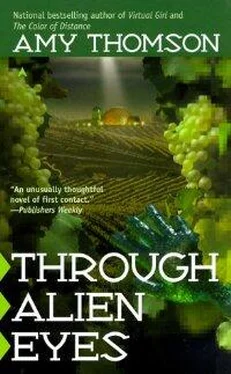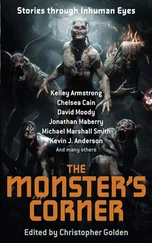Ukatonen nodded, a gesture he had learned from her. “It is a difficult thing to watch your world growing small enough to hold in the palm of ymir hand.”
“Are you sure that this is what you want to do?” Juna asked. “It’s not too late to turn the ship around and go back.”
“Eerin, when have I ever gone back on my word?” Ukatonen said. “You warned me that it would be difficult, but I will learn to live among your people as you learned to live among mine.”
Juna nodded. She hadn’t really expected him to change his mind. Going back would mean a loss of honor so profound that he would have had to kill himself. Still she had to remind him that the option existed.
“Then what can I do to help you adapt?”
Ukatonen shook his head. “Nothing. Everything must happen in here,” he said gesturing at himself with a long, graceful hand.
“And Moki, what about you?” Juna asked.
Moki rippled amusement. “You are my sitik,” he replied. “Your home is my home, your life is my life. Every day you teach me more about how to live among your people. All I need is time, and useful work to do. Though perhaps our cabin could be warmer,” he suggested, “and perhaps more— ” he paused, searching for the correct word— “water in the air.”
“Humidity,” Juna told him. “The word is humidity.” She traced the letters on his arm, showing him how it was spelled. The word flared on his chest several times as he memorized it. Ukatonen practiced the word along with Moki.
“I’ll let the environmental technicians know. And I’ll ask the Life Support people if they’ll let you help them in the garden.”
Waves of blue coursed over Moki’s body. “Thank you, siti,” he said.
“I can’t promise anything, and if you are allowed to help, you must do exactly what the gardeners tell you to.” Moki nodded eagerly, and four horizontal bars flickered across Ukatonen’s chest in acknowledgment. “We look forward to learning the gardeners’ atwa,” the enkar told her. “It will be good to be of use.”
Juna smiled and was about to reply, when she heard them paging her over the ship’s public address system.
She swore in Amharic, the language of her mother. “I’m late for the staff meeting!”
At least I have a good reason for being late, she thought as she headed out the door at a run.
“Welcome, Dr. Saari,” Commander Sussman said as Juna took the last remaining seat. “Let’s begin, shall we?”
Juna listened as the ship’s divisions delivered their reports. It was a good, well-run ship, there were only a couple of minor problems, quickly solved. At last it was her turn.
“By now most of you have met Ukatonen and Moki,” she said. “Hopefully you’ve had time to read through my preliminary report on the Tendu.” She was greeted with mostly blank looks.
“I’m afraid that getting the ship under way has taken up all of the crew’s time, Dr. Saari,” the first mate told her apologetically. “But the crew is interested in the aliens, and will read the report as soon as they can. Perhaps you can summarize the details for us.”
Juna glanced at Commander Sussman, who nodded. “If you would be so kind, Dr. Saari. I’m sure the staff would appreciate it.”
“It is easy to underestimate the Tendu,” Juna began. “Their culture seems quite primitive at first glance, but they have been stable and at peace for many millenia. Their medical and biological sciences surpass our own in many respects. I was dying of anaphylactic shock in the forest when the Tendu found me. They created a symbiotic skin that protected me from the deadly allergens on the planet, and made it possible for me to speak Tendu skin speech. Because of the Tendu’s help, I am the first human to survive on the surface of a living alien world without an environment suit.” Juna paused a moment to let the implications of that sink in before going on.
“Moki and Ukatonen are highly intelligent, and moderately fluent in Standard. They can understand you if you use simple language and speak slowly and clearly. The Tendu language is visual. They “speak” in color and pattern. They also display emotions as color. Red is anger, orange is fear, turquoise is pleasure, and so on. There’s a complete listing in my report.
“When they’re speaking Standard, the Tendu spell the words out on their skin. If you have trouble communicating, try writing out what you are saying. Sometimes that helps. Their name for me is Eerin,” she said, writing out both the Standard spelling and the skin speech glyph.
“Ukatonen, the taller of the two, is an enkar. The enkar are the closest thing the Tendu have to a ruling body, though there is no formal government as such. Mostly the enkar visit villages and help solve problems. Each enkar’s word is law, and if an enkar’s formal judgment goes wrong, that enkar is expected to commit suicide. Ukatonen is almost a thousand years old, and highly respected among his people. He is accustomed to a high degree of respect, and should be treated with great politeness. Think of him as visiting royalty.
“The smaller one is my adopted son, Moki. He is about thirty-four years old. When I met him, he was a tinka, or juvenile, living in a village on the coast. I saved his life, and as a consequence, wound up adopting him. Ukatonen performed the physical transformation that made him into a bami, or sub-adult, and we’ve been together ever since. He is every bit as much my son as any child born of my body would be.”
Juna felt a fierce, protective pride as she remembered the joy of their presences merging during Mold’s first awakening as a bami. That moment of bonding had been the most profound rapport she had ever experienced. His delight and amazement at his own awareness had lifted her out of her loneliness and isolation. Caring for him had helped her make a place for herself among the Tendu.
“Dr. Saari, is it true that the Tendu eat their young?” one of the women in Life Support asked her.
The question jarred Juna from her reminiscences. Of all the differences between the Tendu and humans, that had been the hardest for her to accept. It was even harder to explain it to others, who didn’t have her understanding of the Tendu culture.
“Each year, a female Tendu lays hundreds of eggs, producing far more young than the land can support,” Juna told her. “The surplus tadpoles form a major source of protein for the Tendu during the rainy season.
“It seems harsh to us, but at that point in their life cycle, the tadpoles are barely aware of anything except food. If all of their offspring survived, Tiangi would be awash in Tendu.”
“Doesn’t it bother you?” the woman asked.
“Yes, it does,” Juna confessed, “but this is the way that the Tendu have ordered their society for longer man we have had history. We have no right to tell them how to live their lives.”
“Could you explain a little more about the bond between yourself and Moki?” Commander Sussman asked.
’The relationship between a bami and a sitik is not the same as the one between a human parent and child. A bami can survive quite well on its own. The task of a sitik is to prepare the bami for adulthood, to create a wise elder who is well-schooled in the ways of its village. Once the bami is mature, its sitik either dies or leaves the village and becomes a hermit or an enkar. The bonding process involves a physiological link between the sitik and its bami. Without frequent linking, the bami loses its will to live. If a sitik dies before its bami is mature, the bami will die as well. Moki had to come with me, because otherwise he would have died. Ukatonen came along to help with Moki, and to learn more about us.”
She paused, and a forest of hands rose in the air. She glanced at Commander Sussman, and the commander gave a fractional shake of her head.
Читать дальше

![Корнелл Вулрич - Eyes That Watch You [= The Case of the Talking Eyes]](/books/32103/kornell-vulrich-eyes-that-watch-you-the-case-of-thumb.webp)










